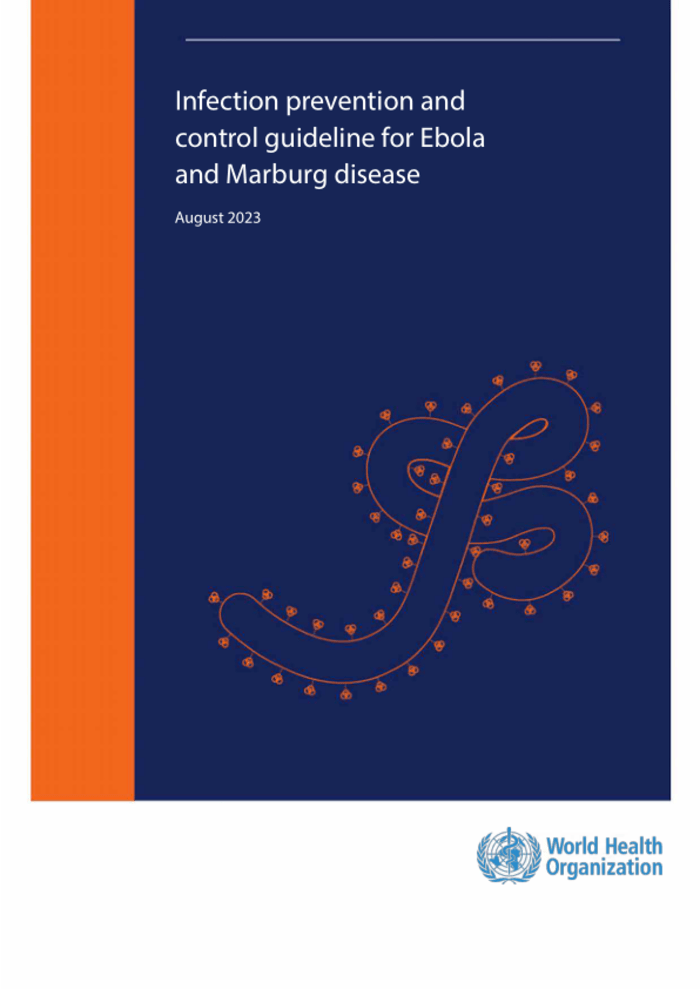Infection
Infection prevention and control guideline for Ebola and Marburg disease, August 2023
5. Executive Summary
Ebola disease and Marburg disease outbreaks continue to occur in Africa, with increased frequency. In addition to resulting in high mortality and morbidity, the outbreaks generate fear and mistrust about the response activities within the communities affected.
Infection prevention and control (IPC) is a key pillar in the outbreak response; adherence to IPC practices can prevent and control transmission of infections to health and care workers, patients and their family members.
During the 2014-2016 West African Ebola disease outbreak, there was an urgent need for rapid IPC guidance to help support ministries of health, health-care providers and non-governmental organizations (NGOs). In response, WHO produced several documents related to the outbreak based on expert opinion, including IPC-specific documents and documents on clinical management that also referenced key IPC principles and practices. Since that time, many practices in the field have become institutionalized.
Three documents formed the basis for WHO’s IPC recommendations for Ebola and Marburg disease:
Since the publication of these documents, multiple outbreaks of Ebola disease and Marburg disease have occurred that have given policy-makers, health administrators and health and care workers more experience in managing these diseases from an IPC perspective. In 2021, the WHO Health Emergencies (WHE) IPC team reviewed existing WHO documents and identified a need to re-evaluate and update guidance. Hence, a WHO Guideline Development Group (GDG) has been working since mid-2021 to update the 2014 WHO interim IPC guidance on filovirus haemorrhagic fever with a focus on Ebola disease and Marburg disease. This update consists of a consolidated WHO guideline that follows the Grading of Recommendations Assessment, Development and Evaluation (GRADE) and evidence-to-decision (EtD) methodology.
The objective of these guidelines is to provide clarity on key IPC recommendations as they pertain to settings that pose different risks to the health and care worker, including screening, triage and providing care to patients with Ebola disease or Marburg disease. In addition to preparing this guideline, the GDG Is creating tools to assist in the implementation of these guidelines.
IPC considerations within Treatment Centres (TCs) may differ from IPC considerations within other health-care facilities (HCFs), both in the training/knowledge of the workers and access to appropriate supplies. This guideline aims to prepare members in all types of HCFs to prepare for Ebola disease or Marburg disease cases and to respond in a manner that protects the infected patients, health and care workers as well as any other patients/visitors/family members who may be in these facilities.
WHO’s IPC GDG for Infection Prevention and control for Ebola and Marburg disease met via several virtual meetings and in person from 25-27 October 2022 in Geneva, Switzerland.
The recommendations set forth in this guideline will be updated as more evidence becomes available. The focus of this first publication is on recommendations regarding the health-care facility setting. Future areas of focus will include community settings as well as settings used by special populations. The recommendations related to health-care settings that included discussions on community settings have been included here. While many recommendations have been updated in this version, some previous recommendations from the 2014 and 2016 IPC guidelines [19] [18] [17] have also been included. If a previous recommendation has been included in this current guideline, it has been flagged as such. A summary of nine previous recommendations that have been carried forward into this guideline is included in Table 1 (these are not included in the new recommendation summary table [Table 2] below).

